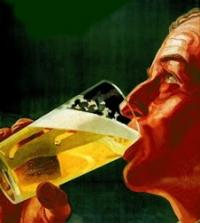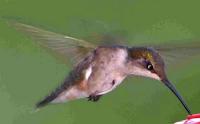Edited by KenLenard, 23 August 2014 - 02:31 PM.

Quick FWH question...
#1

Posted 23 August 2014 - 02:30 PM
#2

Posted 23 August 2014 - 02:55 PM
When I FWH (I also batch sparge), the FWH generally sit in the first wort running for ~15-20 minutes (while the first runnings drain out of the mash tun) before the kettle goes on the burner.
From there, I start heating the first runnings on the burner while the sparge drains into the kettle.
I've found this saves a lot of time vs. collecting all of the runnings before putting the kettle on the burner.
Edit: and yes, first wort hopping rules. ![]()
Edited by Bklmt2000, 23 August 2014 - 02:56 PM.
#3

Posted 23 August 2014 - 03:10 PM
Okay, so I drain the first runnings with hops in the kettle, get the sparge recirc'd and drain and I suppose that after all is said and done, it's probably 20 mins that the FWH and wort have been in contact. Then I take ALL of the runnings out to the burner and start raising the heat. Sounds like it's probably good. I just wondered if 200 years ago in Germany those hops sat in that 150ish wort for 60-90 minutes which might give the beer a different character.
#4

Posted 23 August 2014 - 03:51 PM
When I FWH the first thing in the kettle is that hop addition, then the sparge starts. Done probably 60 - 80 of them. And will do another in the morning.
#5

Posted 23 August 2014 - 05:43 PM
This is the way I have always done it.When I FWH the first thing in the kettle is that hop addition, then the sparge starts. Done probably 60 - 80 of them. And will do another in the morning.
#6

Posted 23 August 2014 - 07:59 PM
The only difference here is I'm heating the first runnings before I start the recirc of the sparge.
#7

Posted 23 August 2014 - 09:14 PM
Yes, this is how I do it. After an hour or so of mashing, I get everything ready to recirc, etc. but the FWH addition goes in first. Recirc, drain (wort meets hops), move onto the sparge. Just did it tonight and everything went smooth.When I FWH the first thing in the kettle is that hop addition, then the sparge starts. Done probably 60 - 80 of them. And will do another in the morning.
#8

Posted 24 August 2014 - 05:36 AM
Has anyone done any experimentation on FWH contact time and temperature? I think that's really what needs to be understood and then we could have some general guidelines on when to put them in and what we'll get out of it.
as for me - they go in the kettle and my two drains of the mash tun go right on top. i don't concern myself too much with how long they are there before the boil starts or anything.
#9

Posted 24 August 2014 - 06:07 AM
I started FWHing before I knew what it was. But after a couple times forgetting to put the bittering hops in when the boil started I just started throwing them in as soon as there was wort in the kettle. All of my recipes are based on this process and I guess someday I should try adding hops after the boil on a regular recipe to see if I can note any difference.
#10

Posted 24 August 2014 - 07:55 AM
Yeah, that was my point... are hops that are in contact with 150°(ish) wort for an hour different than hops that might only be in that wort for 15-20 minutes? Would the character be different? Are they more like a bittering addition if they have been in the wort a shorter time? There has always been a question as to the strength of a FWH addition (standard thinking is that it's like a 20-min addition) and some people have different opinions on that.From Palmer:Has anyone done any experimentation on FWH contact time and temperature? I think that's really what needs to be understood and then we could have some general guidelines on when to put them in and what we'll get out of it. as for me - they go in the kettle and my two drains of the mash tun go right on top. i don't concern myself too much with how long they are there before the boil starts or anything.
I used an ounces of 3.2% German Spalt in my beer yesterday.Another article is HERE but there is no specific information about how long the hops should be in the warm wort before boiling. These articles suggest that there may not be a time length because as soon as the wort makes contact with the hops, "Complex changes take place" with the hop oils, etc. All of this is very interesting because it tells you that hops react with wort of different temps in different ways. The FWH, the Whirlpool, steeping with the lid on after boiling, etc. Cheers Peeps.First Wort HoppingAn old yet recently rediscovered process (at least among homebrewers), first wort hopping (FWH) consists of adding a large portion of the finishing hops to the boil kettle as the wort is received from the lauter tun. As the boil tun fills with wort (which may take a half hour or longer), the hops steep in the hot wort and release their volatile oils and resins. The aromatic oils are normally insoluble and tend to evaporate to a large degree during the boil. By letting the hops steep in the wort prior to the boil, the oils have more time to oxidize to more soluble compounds and a greater percentage are retained during the boil.Only low alpha finishing hops should be used for FWH, and the amount should be no less than 30% of the total amount of hops used in the boil. This FWH addition therefore should be taken from the hops intended for finishing additions. Because more hops are in the wort longer during the boil, the total bitterness of the beer in increased but not by a substantial amount due to being low in alpha acid. In fact, one study among professional brewers determined that the use of FWH resulted in a more refined hop aroma, a more uniform bitterness (i.e. no harsh tones), and a more harmonious beer overall compared to an identical beer produced without FWH.
#11

Posted 24 August 2014 - 09:33 AM
I've spent a lot of time looking for any info on contact for FWH and I've always come up empty. I've dine a few trials, but not enough to really what's enough and what's not. Like you guys, my usual contact time is around 15-20 min. and that does seem to work.
BTW, John's recommendation to only use low alpha hops is pretty much BS. He was simply repeating an old study and did no testing on his own. You can use any hops you like the flavor of for FWH. Alpha matters only as far as the amount of bittering you get from them, not their efficacy as FWH.
#12

Posted 24 August 2014 - 10:04 AM
I started FWHing before I knew what it was. But after a couple times forgetting to put the bittering hops in when the boil started I just started throwing them in as soon as there was wort in the kettle. All of my recipes are based on this process and I guess someday I should try adding hops after the boil on a regular recipe to see if I can note any difference.
I myself, like yourself had inadvertently discovered FWHing the exact same way, in my first couple of batches in 2002 ![]()
0 user(s) are reading this topic
0 members, 0 guests, 0 anonymous users














